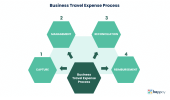Introduction
Studies predict that the market for business travel will pick up steam and reach $829.5 billion by 2027. Organizations research the various parameters related to business travel costs to improve their management of these costs. Travel managers regard policy compliance and costs as the most important KPIs among the many available measures. Let's attempt to have a thorough understanding of business trip expenses.
What are Business travel expenses?
Business travel expenses are those incurred by employees when they travel for work. The cost of such an expense is determined by the mode of transportation (air, rail, bus, etc.) and the rank of the employee (if it is a director or an employee at a lower level of the organization). Such travel may be from their own city, state, or nation for job. The cost of meals, lodging, and other necessities for carrying out business objectives may be incurred depending on the distance travelled and the length of the business trip.

Types of business travel expense
Depending on the organisation, many terms may be used to define business travel expenses. To reach a client, for instance, a small business that conducts a sizable portion of its business locally may define business travel expenses in terms of mileage (cab) or fuel costs (personal vehicle). On the other hand, a huge company can define the word as any expenditure made to further the objectives of the firm (including airfare, hotel accommodations, and even broadband connections).
Claimable travel expenses
1. Travel expenses
Travel expenses are those incurred when leaving the home city. As a result, travel costs for buses, trains, aeroplanes, and taxis are all directly allowable. The only difference between the definitions is the cat that is available for use. For instance, if we use the aforementioned example, smaller enterprises could only have a limited amount of money set up for local travel. Larger businesses, on the other hand, might have policies that cover maximums for rail or flight fares.
2. Food expenses
Employees may deduct the cost of food and beverages they consume when travelling for work or eating meals with clients. Such costs may count as business travel expenses as long as they are neither exorbitant or lavish. Employees must provide legitimate receipts for all expenses, no matter how minor or large.

